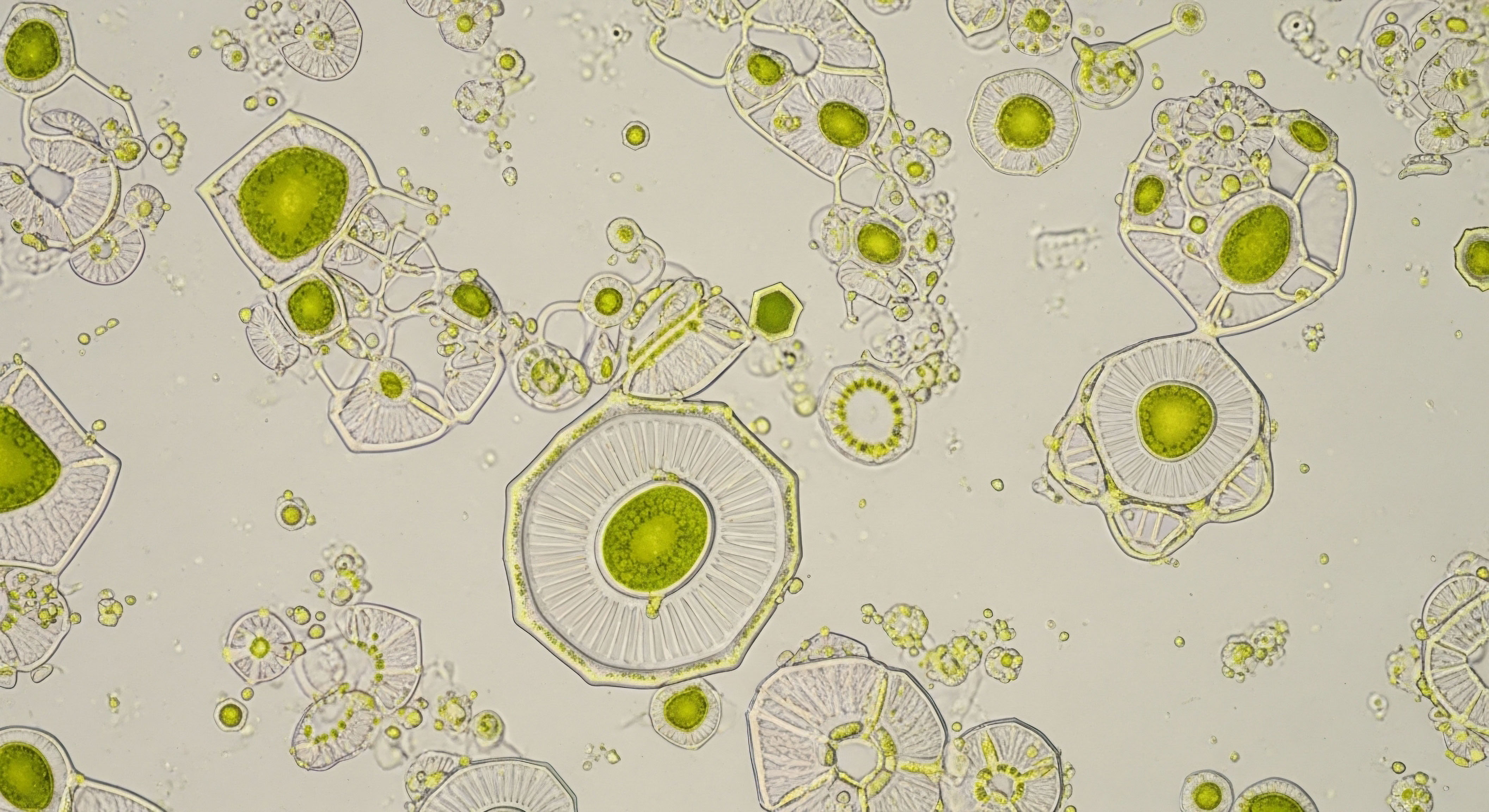

Fundamentals
Many individuals experience moments when their thoughts feel clouded, their mood shifts without a clear reason, or their usual mental sharpness seems to wane. Perhaps you have noticed a subtle change in your ability to recall details, a persistent sense of unease, or a diminished capacity to manage daily stressors.
These experiences are not simply a matter of perception; they often signal deeper biological shifts within the body, particularly within the intricate network of the endocrine system. Understanding these internal communications is the first step toward reclaiming mental clarity and emotional equilibrium.
Our biological systems are constantly communicating, sending signals that orchestrate every function, from cellular repair to complex thought processes. Hormones, these chemical messengers, travel throughout the bloodstream, reaching distant cells and tissues, including the brain. They act as a sophisticated internal messaging service, influencing not only physical attributes but also the very architecture and function of our neural pathways.
When these hormonal signals fluctuate, whether due to natural life transitions or other influences, the brain’s delicate chemistry can respond in kind, leading to noticeable changes in how we think, feel, and interact with the world.
Hormones serve as vital chemical messengers, influencing brain structure and function, thereby shaping our cognitive and emotional experiences.

The Endocrine System and Brain Communication
The endocrine system comprises a collection of glands that produce and secrete hormones directly into the circulatory system. These glands include the pituitary, thyroid, adrenal glands, pancreas, and gonads. Unlike neurotransmitters, which act locally and rapidly across synaptic clefts, hormones exert widespread and often longer-lasting effects.
They bind to specific receptors on target cells, initiating a cascade of biological responses. This broad reach means that hormonal shifts can affect numerous brain regions simultaneously, leading to a spectrum of cognitive and emotional responses.
The brain itself is not merely a recipient of hormonal signals; it is an active participant in this communication loop. The hypothalamus, a region deep within the brain, acts as a central control hub, coordinating with the pituitary gland to regulate the release of hormones from other endocrine glands.
This intricate feedback system, often called an axis, ensures that hormone levels are maintained within a precise range. Disruptions to this delicate balance can send ripples through the entire system, impacting brain function.

Key Hormones and Their Initial Brain Impact
Several primary hormones play a significant role in modulating brain chemistry:
- Estrogen ∞ Predominantly recognized for its role in female reproductive health, estrogen also has a substantial impact on brain function. It influences memory, mood regulation, and cognitive processing. Estrogen receptors are present in various brain regions, including the hippocampus, which is vital for memory formation, and the prefrontal cortex, involved in executive functions. Fluctuations in estrogen levels, such as those occurring during the menstrual cycle, perimenopause, or menopause, can alter neurotransmitter activity, affecting serotonin, dopamine, and gamma-aminobutyric acid (GABA) systems.
- Progesterone ∞ This hormone, particularly its metabolites, exerts calming and neuroprotective effects. Progesterone enhances GABA transmission, which is the brain’s primary inhibitory neurotransmitter, contributing to feelings of tranquility and reducing anxiety. Changes in progesterone levels can therefore influence emotional stability and sleep patterns.
- Testosterone ∞ While often associated with male physiology, testosterone is also present in women and plays a role in cognitive functions for both sexes. It influences spatial memory, attention, and mood. Receptors for testosterone are found throughout the brain, and its presence supports neuronal health and connectivity. Declining testosterone levels can be associated with reduced concentration and memory lapses.
- Cortisol ∞ As the body’s primary stress hormone, cortisol is essential for managing acute stress responses. However, chronically elevated cortisol levels can have detrimental effects on brain structures, particularly the hippocampus, potentially impairing memory and contributing to mood dysregulation.
- Thyroid Hormones ∞ These hormones regulate metabolism across all body cells, including brain cells. Both insufficient (hypothyroidism) and excessive (hyperthyroidism) thyroid hormone levels can lead to cognitive impairments, including difficulties with concentration, memory, and mood disturbances.
Understanding these foundational connections between hormones and brain function provides a framework for recognizing how internal biological shifts can translate into lived experiences of mental and emotional change. The brain’s capacity to adapt and respond to these hormonal signals underscores its remarkable malleability, yet also highlights its vulnerability when these signals become imbalanced.


Intermediate
Recognizing the profound influence of hormonal balance on mental well-being naturally leads to questions about how these systems can be supported or recalibrated when they deviate from optimal function. Personalized wellness protocols, particularly those involving targeted hormonal optimization, represent a sophisticated approach to addressing these imbalances. These interventions aim to restore physiological harmony, thereby alleviating symptoms that compromise cognitive and emotional vitality.
The objective of these protocols extends beyond merely treating symptoms; it involves a deep understanding of the underlying biochemical mechanisms to support the body’s innate capacity for self-regulation. By carefully introducing specific agents, we can influence the intricate feedback loops that govern hormone production and action, ultimately impacting brain chemistry in a beneficial manner.
Targeted hormonal optimization protocols aim to restore physiological balance, thereby enhancing cognitive and emotional well-being.

Testosterone Optimization Protocols
Testosterone, a vital androgen, plays a multifaceted role in brain health for both men and women. Its influence extends to mood regulation, cognitive processing, and even neuroprotection. When testosterone levels decline, individuals may experience symptoms such as diminished mental acuity, reduced motivation, and alterations in mood.

Testosterone Replacement Therapy for Men
For men experiencing symptoms of low testosterone, often termed andropause, Testosterone Replacement Therapy (TRT) is a common protocol. The standard approach frequently involves weekly intramuscular injections of Testosterone Cypionate (200mg/ml). This method ensures a steady delivery of the hormone, helping to stabilize its levels within a physiological range.
The impact of TRT on brain chemistry is significant. Testosterone influences the density and function of various neurotransmitter receptors, including those for serotonin and dopamine. By modulating these systems, TRT can contribute to improved mood, reduced irritability, and enhanced cognitive functions such as memory and processing speed. Studies indicate that men undergoing TRT may experience improvements in spatial memory and executive function.
To maintain the body’s natural endocrine rhythm and preserve fertility, TRT protocols often incorporate additional agents:
- Gonadorelin ∞ Administered via subcutaneous injections, typically twice weekly, Gonadorelin stimulates the pituitary gland to release luteinizing hormone (LH) and follicle-stimulating hormone (FSH). This helps to maintain testicular function and endogenous testosterone production, preventing testicular atrophy.
- Anastrozole ∞ This oral tablet, usually taken twice weekly, acts as an aromatase inhibitor. Aromatase is an enzyme that converts testosterone into estrogen. By blocking this conversion, Anastrozole helps to manage estrogen levels, preventing potential side effects associated with elevated estrogen, such as mood swings or gynecomastia. Maintaining optimal estrogen balance is also important for brain health, as both too high and too low levels can be detrimental.
- Enclomiphene ∞ In some cases, Enclomiphene may be included. This medication selectively blocks estrogen receptors in the pituitary, leading to an increase in LH and FSH, thereby stimulating natural testosterone production. It can be particularly useful for men seeking to support their natural endocrine function while optimizing testosterone levels.

Testosterone Replacement Therapy for Women
Women also experience the effects of declining testosterone, which can manifest as irregular cycles, mood changes, reduced libido, and cognitive shifts. Protocols for women are carefully tailored to their unique physiological needs and menopausal status.
A typical approach involves low-dose Testosterone Cypionate, often 10 ∞ 20 units (0.1 ∞ 0.2ml) weekly via subcutaneous injection. This lower dosage accounts for women’s physiological requirements, aiming to restore balance without inducing virilizing effects. Testosterone in women supports cognitive vitality, mood stability, and overall well-being.
Progesterone is a key component of female hormone balance protocols, prescribed based on menopausal status. Progesterone’s calming effects on the brain, mediated through its influence on GABA, are particularly beneficial for managing mood fluctuations and sleep disturbances often associated with hormonal transitions.
For sustained delivery, Pellet Therapy, involving long-acting testosterone pellets, can be an option. When appropriate, Anastrozole may also be used in women to manage estrogen conversion, especially if higher testosterone doses are required or if there is a predisposition to elevated estrogen.

Growth Hormone Peptide Therapy
Beyond traditional hormone replacement, peptide therapies offer another avenue for optimizing physiological function, with notable implications for brain health. Growth hormone-releasing peptides (GHRPs) stimulate the body’s natural production of growth hormone (GH), which plays a role in cellular repair, metabolic regulation, and cognitive function.
Growth hormone influences brain chemistry by supporting neuronal health, synaptic plasticity, and overall metabolic efficiency within the central nervous system. Improved GH levels can contribute to enhanced cognitive performance, better sleep quality, and a general sense of vitality.
Key peptides utilized in these protocols include:
- Sermorelin ∞ A growth hormone-releasing hormone (GHRH) analog that stimulates the pituitary gland to secrete GH.
- Ipamorelin / CJC-1295 ∞ These peptides work synergistically to increase GH release. Ipamorelin is a selective GHRP, while CJC-1295 is a GHRH analog that has a longer duration of action.
- Tesamorelin ∞ A GHRH analog that specifically reduces visceral adipose tissue and has shown cognitive benefits in some populations.
- Hexarelin ∞ Another GHRP that also exhibits cardioprotective properties.
- MK-677 (Ibutamoren) ∞ An oral growth hormone secretagogue that stimulates GH release by mimicking ghrelin.
These peptides are typically administered via subcutaneous injection, often at night, to align with the body’s natural pulsatile release of growth hormone. The goal is to gently encourage the body’s own systems to function more optimally, rather than simply replacing a hormone.

Other Targeted Peptides for Brain Health
Specific peptides can also address targeted aspects of well-being that indirectly support brain chemistry:
- PT-141 (Bremelanotide) ∞ Primarily known for its role in sexual health, PT-141 acts on melanocortin receptors in the brain, influencing sexual desire and arousal. By addressing aspects of sexual function, it can contribute to overall psychological well-being, which in turn supports a more balanced brain chemistry.
- Pentadeca Arginate (PDA) ∞ This peptide is utilized for its properties in tissue repair, healing, and inflammation modulation. Chronic inflammation can negatively impact brain health and contribute to mood disorders. By supporting systemic healing and reducing inflammation, PDA indirectly creates a more favorable environment for optimal brain function.
These protocols represent a sophisticated understanding of biological systems, moving beyond simplistic symptom management to address the root causes of imbalance. The careful selection and administration of these agents, under expert guidance, can significantly influence brain chemistry, leading to a restoration of cognitive clarity, emotional stability, and overall vitality.
| Hormone Imbalance | Common Cognitive Symptoms | Common Emotional Symptoms |
|---|---|---|
| Low Estrogen | Memory lapses, brain fog, difficulty concentrating | Mood swings, irritability, anxiety, depression |
| Low Testosterone (Men) | Reduced focus, slower processing speed, memory issues | Low motivation, fatigue, irritability, reduced sense of well-being |
| Low Testosterone (Women) | Reduced mental sharpness, difficulty with spatial tasks | Low libido, fatigue, mild mood changes |
| Low Progesterone | Poor sleep quality, difficulty with recall | Increased anxiety, irritability, premenstrual syndrome (PMS) symptoms |
| High Cortisol (Chronic) | Impaired memory, difficulty with learning, brain fog | Chronic stress, anxiety, depression, emotional dysregulation |
| Thyroid Imbalance | Concentration difficulties, memory loss, slowed thinking | Fatigue, depression (hypo), anxiety, restlessness (hyper) |


Academic
The profound connection between hormonal fluctuations and brain chemistry extends into the intricate molecular and cellular mechanisms that govern neural function. A deep exploration of this relationship requires a systems-biology perspective, recognizing that the endocrine system does not operate in isolation but is inextricably linked with the nervous and immune systems. This interconnectedness shapes everything from neurotransmitter synthesis and receptor sensitivity to neuronal plasticity and overall brain metabolic health.
Understanding the precise pathways through which hormones exert their influence provides a robust framework for developing and refining personalized wellness protocols. It moves beyond a superficial understanding of symptoms to address the root biological underpinnings of cognitive and emotional well-being.
Hormonal influences on brain chemistry are rooted in complex molecular and cellular mechanisms, impacting neurotransmission and neuronal plasticity.

The Hypothalamic-Pituitary-Gonadal Axis and Brain Function
The Hypothalamic-Pituitary-Gonadal (HPG) axis represents a prime example of a neuroendocrine feedback loop that profoundly influences brain chemistry. The hypothalamus releases gonadotropin-releasing hormone (GnRH), which stimulates the pituitary gland to secrete luteinizing hormone (LH) and follicle-stimulating hormone (FSH). These gonadotropins then act on the gonads (testes in men, ovaries in women) to produce sex hormones like testosterone, estrogen, and progesterone. These sex hormones, in turn, exert feedback on the hypothalamus and pituitary, regulating their own production.
This axis is not merely a reproductive regulator; its components and the hormones it produces have direct actions within the brain. For instance, GnRH receptors are found in various extra-hypothalamic brain regions, suggesting roles beyond reproductive control. LH and FSH also have receptors in the brain, influencing neuronal activity and potentially contributing to cognitive processes. The sex hormones themselves readily cross the blood-brain barrier, interacting with specific receptors on neurons and glial cells.

Steroid Hormones as Neurosteroids
Estrogen, progesterone, and testosterone are not only systemic hormones but also function as neurosteroids, meaning they can be synthesized de novo within the brain and exert rapid, non-genomic effects on neuronal excitability. This dual role allows for both long-term genomic effects (influencing gene expression and protein synthesis) and immediate modulatory effects on neurotransmitter systems.
For example, estrogen influences the serotonergic system by increasing the synthesis of serotonin through enhanced activity of tryptophan hydroxylase, a key enzyme in serotonin production. It also inhibits monoamine oxidase (MAO), an enzyme that degrades serotonin and other monoamines, thereby prolonging their presence in the synaptic cleft. Estrogen also modulates dopaminergic activity by influencing dopamine receptor density and neurotransmitter release, which impacts reward pathways, motivation, and motor control.
Progesterone metabolites, such as allopregnanolone, are potent positive allosteric modulators of GABA-A receptors. This action enhances the inhibitory effects of GABA, leading to anxiolytic (anxiety-reducing) and sedative properties. This explains why fluctuations in progesterone can significantly impact mood and sleep architecture.
Testosterone, through its conversion to estradiol via aromatase or to dihydrotestosterone (DHT) via 5-alpha reductase, also influences brain function. Testosterone receptors are present in the hippocampus, prefrontal cortex, and amygdala, affecting spatial cognition, verbal memory, and emotional regulation. Research indicates that testosterone can protect neurons from oxidative stress and support synaptic plasticity, contributing to cognitive resilience.

Metabolic Function and Neurotransmitter Interplay
The brain is a highly metabolically active organ, and its function is intimately tied to systemic metabolic health. Hormones like insulin, leptin, and ghrelin, traditionally associated with metabolism and appetite, also have significant roles in brain chemistry.
Insulin receptors are abundant in the brain, particularly in regions involved in learning and memory. Insulin signaling in the brain is crucial for neuronal glucose uptake, energy homeostasis, and synaptic function. Insulin resistance, a hallmark of metabolic dysfunction, can impair brain insulin signaling, contributing to cognitive decline and increasing vulnerability to neurodegenerative conditions.
Leptin, a hormone produced by adipose tissue, signals satiety to the brain and influences energy balance. It also plays a role in neuronal survival, synaptic plasticity, and neurogenesis. Dysregulation of leptin signaling can impact mood and cognitive function.
The interplay between these metabolic hormones and neurotransmitters is complex. For instance, chronic metabolic stress can lead to systemic inflammation and oxidative stress, both of which negatively impact neurotransmitter systems. Inflammation can alter tryptophan metabolism, shunting it away from serotonin production towards neurotoxic kynurenine pathways, contributing to depressive symptoms.
Consider the profound impact of chronic stress, mediated by sustained elevations in cortisol. While acute cortisol release is adaptive, prolonged exposure can lead to structural changes in the hippocampus, reducing dendritic branching and impairing neurogenesis. This can result in compromised memory function and increased susceptibility to mood disorders. Cortisol dysregulation is associated with altered serotonin, dopamine, and norepinephrine pathways, contributing to anhedonia and withdrawal.
The goal of personalized wellness protocols is to address these interconnected systems. By optimizing hormonal balance and supporting metabolic health, we aim to create an internal environment where neurotransmitter systems can function optimally, neuronal networks are resilient, and cognitive and emotional vitality can be sustained. This comprehensive approach recognizes that true well-being stems from a harmonious interplay of all biological systems.
| Hormone | Primary Neurotransmitter Influence | Mechanism of Action |
|---|---|---|
| Estrogen | Serotonin, Dopamine, GABA | Increases serotonin synthesis, inhibits MAO, modulates dopamine receptor density, decreases GABA release. |
| Progesterone | GABA | Metabolites (e.g. allopregnanolone) enhance GABA-A receptor activity, promoting inhibitory effects. |
| Testosterone | Dopamine, Serotonin, Glutamate | Influences dopamine and serotonin pathways, supports neuronal health, potentially modulates glutamate excitotoxicity. |
| Cortisol | Serotonin, Dopamine, Norepinephrine | Chronic elevation can downregulate serotonin receptor expression, reduce dopamine signaling, alter norepinephrine transmission. |
| Thyroid Hormones | Serotonin, Norepinephrine | Regulate synthesis and receptor sensitivity of various neurotransmitters, crucial for overall brain metabolism. |

How Do Hormonal Interventions Recalibrate Brain Chemistry?
The administration of exogenous hormones or peptides in a therapeutic setting is designed to re-establish physiological equilibrium, thereby influencing brain chemistry through multiple pathways. For instance, Testosterone Replacement Therapy (TRT) directly elevates circulating testosterone levels. This increase allows for greater binding to androgen receptors within the brain, particularly in areas associated with mood and cognition.
The subsequent conversion of testosterone to estradiol and DHT within brain tissue further modulates local neurosteroid levels, impacting the activity of serotonin, dopamine, and GABA systems. This recalibration can lead to improvements in cognitive domains such as spatial memory and executive function, as observed in clinical studies.
Similarly, growth hormone peptide therapies, by stimulating the endogenous release of growth hormone, influence brain metabolism and neuronal plasticity. Growth hormone and its downstream mediator, insulin-like growth factor 1 (IGF-1), cross the blood-brain barrier and exert neurotrophic effects, supporting the growth and survival of neurons.
This can enhance synaptic connectivity and improve overall brain energetic efficiency, contributing to better cognitive performance and mood stability. The systemic reduction of inflammation and oxidative stress, often a secondary benefit of optimized hormonal status, also creates a more conducive environment for healthy neurotransmitter function.
The precision of these interventions lies in their ability to target specific pathways that have become dysregulated. By understanding the intricate feedback loops and the molecular actions of hormones and peptides, clinicians can tailor protocols that not only alleviate symptoms but also address the underlying biochemical imbalances, promoting sustained brain health and vitality. This approach represents a sophisticated application of endocrinology and neuroscience, translating complex scientific principles into tangible improvements in lived experience.

References
- Goard, Michael, and Emily Jacobs. “Hormone cycles shape the structure and function of key memory regions in the brain.” Neuron, 2025.
- Del Río, Javier, et al. “Steroid Hormones and their Action in Women’s Brains ∞ The Importance of Hormonal Balance.” Frontiers in Public Health, 2018.
- Baksu, Alparslan. “Psychological Effects of Hormonal Disorders in Women.” Prof. Dr. Alparslan Baksu, 2025.
- Women’s Brain Health Initiative. “The Effects of Hormones on Brain Health.” Women’s Brain Health Initiative, 2018.
- Chaudhuri, Alpana and Murari. “Hormones and Neurotransmitters ∞ The Differences and Curious Similarities.” The Biochemists, 2018.
- Cherrier, Michael M. et al. “Testosterone Replacement Therapy and Cognitive Performance in Men with Mild Cognitive Impairment.” Journal of Clinical Endocrinology & Metabolism, 2005.
- Jovanovic, Predrag, et al. “Testosterone and Serotonergic Transmission.” Journal of Psychiatric Research, 2014.
- Kranz, G. et al. “Testosterone and Depression ∞ A Review of the Evidence.” Psychoneuroendocrinology, 2014.

Reflection
The journey toward understanding your own biological systems is a deeply personal one, often beginning with a recognition of subtle shifts in how you feel and function. The insights shared here, detailing the intricate interplay between hormones and brain chemistry, are not merely academic concepts. They serve as a guide, offering a framework for interpreting your lived experience through a scientific lens. This knowledge is a powerful tool, providing the clarity needed to ask informed questions and seek personalized guidance.
Recognizing the profound impact of hormonal balance on cognitive and emotional vitality is the first step. It invites a proactive stance toward well-being, moving beyond passive acceptance of symptoms to an active pursuit of physiological optimization. Your unique biological blueprint requires a tailored approach, one that respects the complexity of your internal systems. This understanding empowers you to partner with clinical experts, charting a course toward reclaiming vitality and function without compromise.



